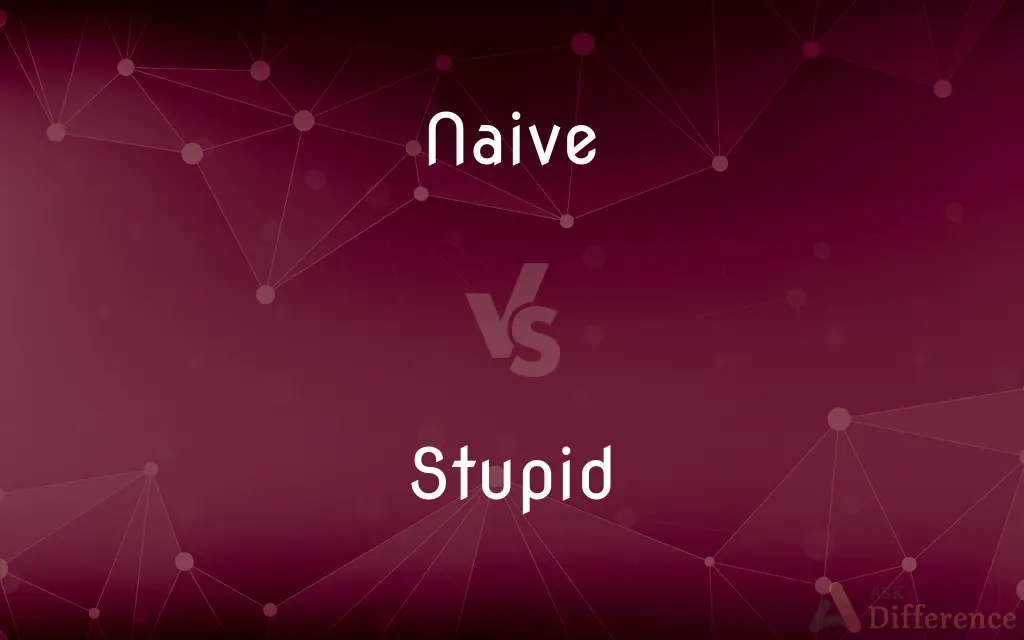Naive vs. Stupid — What's the Difference?
By Tayyaba Rehman — Published on January 7, 2024
Naive implies a lack of experience or judgment, often leading to undue trust or simplicity; stupid denotes a lack of intelligence or understanding, often resulting in foolish actions or decisions.

Difference Between Naive and Stupid
Table of Contents
ADVERTISEMENT
Key Differences
Naive is a term that often reflects innocence or a lack of worldly experience, leading one to trust too easily or fail to recognize ulterior motives. It suggests a purity of perception, not clouded by cynicism or skepticism. Stupid, in contrast, is a harsher term implying a lack of intelligence or common sense. It often indicates a person's inability to understand or learn from experiences, leading to poor judgment or irrational decisions.
When someone is described as naive, it may imply a certain charm or endearing quality, as their innocence shields them from the more manipulative aspects of the world. Their actions are based on a straightforward view of the world, often assuming the best in others. On the other hand, being called stupid suggests a more critical view of a person's cognitive abilities. It denotes an inability to process information effectively, often leading to mistakes that could have been avoided with better reasoning or understanding.
Naive individuals often make decisions based on limited experience or knowledge, not necessarily due to a lack of intelligence, but rather due to a lack of exposure to more complex or varied situations. Their judgments are not so much wrong as they are uninformed. In contrast, stupid behavior or decisions often arise even in the presence of adequate information and experience, indicating a failure in reasoning or learning.
In terms of personal development, naivety can be seen as a temporary state, one that diminishes as a person gains more life experience and knowledge. In many cases, naivety is a phase that everyone passes through. Stupidity, however, is often perceived as a more static trait, suggesting a fundamental limitation in one's ability to learn, adapt, or understand, regardless of experience or education.
Comparison Chart
Basis of Trait
Lack of experience or exposure
Lack of intelligence or understanding
ADVERTISEMENT
Perception
Often seen as innocent or endearing
Viewed negatively, indicating foolishness
Changeability
Usually diminishes with experience
Often perceived as a static trait
Decision-Making
Based on limited knowledge or exposure
Poor judgment despite available information
Social Implications
May evoke sympathy or protectiveness
Often attracts criticism or frustration
Compare with Definitions
Naive
Unsophisticated: Lacking worldly wisdom, like a child.
She was naive enough to believe the salesman at his word.
Stupid
Lacking Intelligence: Showing a great lack of intelligence or common sense.
It was stupid to go hiking alone without a map.
Naive
Inexperienced: Showing a lack of experience or knowledge.
His naive approach to politics made him underestimate the complexity of the issues.
Stupid
Irrational: Not guided by or based on good reasoning.
Taking a loan to buy lottery tickets is stupid and risky.
Naive
Artless: Free from deceit or cunning; natural.
The child's naive questions about the world were refreshingly honest.
Stupid
Foolish: Marked by a lack of good judgment or sense.
His stupid decision to drive too fast resulted in an accident.
Naive
Unaffected: Not influenced by external factors; simple.
Her naive charm was evident in her straightforward manner of speaking.
Stupid
Dull-witted: Slow to understand or learn.
He was often criticized for his stupid questions in class.
Naive
Gullible: Easily deceived or tricked due to innocence.
Her naive trust in strangers often got her into trouble.
Stupid
Senseless: Without reasonable or logical basis.
Making the same mistake repeatedly is just stupid.
Naive
Simple and guileless; artless
A child with a naive charm.
Stupid
Slow to learn or understand; obtuse.
Naive
Unsuspecting or credulous
Naive victims of the scam.
Stupid
Tending to make poor decisions or careless mistakes.
Naive
Showing or characterized by a lack of sophistication and critical judgment
"this extravagance of metaphors, with its naive bombast" (H.L. Mencken).
Stupid
Marked by a lack of intelligence or care; foolish or careless
A stupid mistake.
Naive
Not previously subjected to experiments
Testing naive mice.
Stupid
Dazed, stunned, or stupefied
Felt stupid after taking the pain medication.
Naive
Not having previously taken or received a particular drug
Patients naive to antipsychotic medication.
Stupid
Used to express disparagement or exasperation
Take your stupid notebook and go home.
Naive
One who is artless, credulous, or uncritical.
Stupid
A stupid or foolish person.
Naive
Lacking worldly experience, wisdom, or judgement; unsophisticated.
Stupid
Lacking in intelligence or exhibiting the quality of having been done by someone lacking in intelligence.
Because it's a big stupid jellyfish!
Naive
Not having been exposed to something.
Stupid
To the point of stupor.
Neurobiology bores me stupid.
Naive
(of art) Produced in a simple, childlike style, deliberately rejecting sophisticated techniques.
Stupid
(archaic) Characterized by or in a state of stupor; paralysed.
Naive
Intuitive; designed to follow the way ordinary people approach a problem.
Stupid
(archaic) Lacking sensation; inanimate; destitute of consciousness; insensate.
Naive
A naive person; a greenhorn.
Stupid
Dulled in feeling or sensation; torpid.
Naive
Having native or unaffected simplicity; ingenuous; artless; frank; as, naïve manners; a naïve person; naïve and unsophisticated remarks.
Stupid
(slang) Amazing.
That dunk was stupid! His head was above the rim!
Naive
Having a lack of knowledge, judgment, or experience; especially, lacking sophistication in judging the motives of others; credulous; as, a naive belief in the honesty of politicians.
Stupid
(slang) Darn, annoying.
I fell over the stupid wire.
Naive
Marked by or showing unaffected simplicity and lack of guile or worldly experience;
A teenager's naive ignorance of life
The naive assumption that things can only get better
This naive simple creature with wide friendly eyes so eager to believe appearances
Stupid
(slang) Extremely.
My gear is stupid fly.
Naive
Lacking experience of life;
A callow youth of seventeen
Stupid
A stupid person; a fool.
Naive
Lacking sophistication
Stupid
The condition or state of being stupid; stupidity, stupidness.
His stupid knows no bounds.
Stupid
Very dull; insensible; senseless; wanting in understanding; heavy; sluggish; in a state of stupor; - said of persons.
O that men . . . should be so stupid grown . . . As to forsake the living God!
With wild surprise,A moment stupid, motionless he stood.
Stupid
Resulting from, or evincing, stupidity; formed without skill or genius; dull; heavy; - said of things.
Observe what loads of stupid rhymesOppress us in corrupted times.
Stupid
A person who is not very bright;
The economy, stupid!
Stupid
Lacking or marked by lack of intellectual acuity
Stupid
In a state of mental numbness especially as resulting from shock;
He had a dazed expression on his face
Lay semiconscious, stunned (or stupefied) by the blow
Was stupid from fatigue
Stupid
Without much intelligence;
A dull job with lazy and unintelligent co-workers
Common Curiosities
Can naivety be positive?
Yes, it can be seen as a sign of innocence or purity of intention.
Can education cure stupidity?
Education can help, but some aspects of stupidity, like poor judgment, may persist.
Is naivety linked to age?
Often associated with youth, but adults can be naive too, especially in unfamiliar situations.
Is being naive always a disadvantage?
Not always; it can sometimes protect a person from the cynicism of the world.
Can a smart person be naive?
Yes, intelligence and naivety are not mutually exclusive; a smart person can be naive in certain areas.
Does naivety affect decision-making?
Yes, it can lead to overly simplistic or overly trusting decisions.
Is stupidity always a permanent trait?
Not necessarily; it can sometimes be overcome with education and awareness.
Can being stupid be an insult?
Yes, it's often used derogatorily to criticize a person's intellect or decisions.
Is naivety always about lack of knowledge?
Primarily, though it can also be about lack of experience or exposure.
Can stupidity be humorous?
In certain contexts, it can be, especially in comedy or entertainment.
Can life experiences reduce naivety?
Absolutely, as experiences often bring a deeper understanding of the world.
Is it offensive to call someone naive?
It can be, depending on context and intent, though it's generally less harsh than "stupid."
Can a person be both naive and stupid?
Yes, though they are different traits, they can coexist in the same person.
Are there different levels of stupidity?
Yes, it can range from minor lapses in judgment to severe intellectual challenges.
Is stupidity always evident in actions?
Often, but not always; some may hide it well or only show it in specific situations.
Share Your Discovery

Previous Comparison
VPN vs. Proxy
Next Comparison
Pyrethrin vs. PermethrinAuthor Spotlight
Written by
Tayyaba RehmanTayyaba Rehman is a distinguished writer, currently serving as a primary contributor to askdifference.com. As a researcher in semantics and etymology, Tayyaba's passion for the complexity of languages and their distinctions has found a perfect home on the platform. Tayyaba delves into the intricacies of language, distinguishing between commonly confused words and phrases, thereby providing clarity for readers worldwide.













































